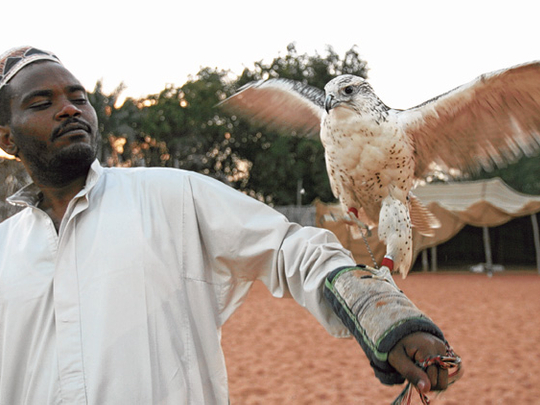
Nairobi: Unesco has announced that falconry is to be included in its official list of the ‘Intangible Cultural Heritage of Humanity'.This is largely thanks to the efforts of the UAE, in cooperation with 11 other countries, many of whom are Arab, and comes in advance of the international falconry programme.
The announcement came during a meeting of the Intergovernmental Committee for Intangible Cultural Heritage of Unesco, which was held in Nairobi, Kenya, from November 15 to 19.
The event was attended by a UAE delegation, headed by Mohammad Khalaf Al Mazroui, the Adviser for Culture and Heritage at the Court of the Crown Prince of Abu Dhabi, and the Director General of the Abu Dhabi Authority for Culture and Heritage (ADACH).
The Intergovernmental Committee for Intangible Cultural Heritage unanimously approved the registration of falconry as part of ‘live human heritage' at the event.
Shaikh Sultan Bin Tahnoun Al Nahyan, Chairman of ADACH, pointed out that the UAE had achieved great success in preserving elements of heritage such as falconry. He added that ADACH now plans to complete the official falconry file, in cooperation with several government bodies and in coordination with other countries. In this respect it will follow the directions of President His Highness Shaikh Khalifa Bin Zayed Al Nahyan and General Shaikh Mohammad Bin Zayed Al Nahyan, Crown Prince of Abu Dhabi and Deputy Supreme Commander of the Armed Forces.
The UAE, he said, "has spared no effort in supporting conservation projects on heritage, especially falconry, which is an important part of our culture and ancient history".
"Our nation still continues its tireless efforts to support Unesco's plans and programmes to preserve cultural heritage and the human patrimony of mankind," he said.
He stressed that the inclusion of falconry on the Unesco list is a unique achievement in the Arab world. He drew attention to the fact that it is here that falconry is most recognised.
Falconry, in the UAE, he said, is easily considered a cultural element because it is an inherent and distinct part of local heritage, which expresses the pride of the Arab world and its people.
"This decision today [is the culmination of] a sustained effort and continued work that has lasted for five years, thanks to intensive efforts by ADACH and the Emirates Falconers Club; the Environment Agency — Abu Dhabi and the Ministry of Culture and a number of [other] authorities," he said.
He pointed out that the registration of falconry, a project taken on by ADACH, is just one of the ongoing heritage projects, which reflect the need for co-existence and civil and cultural integration between societies around the world.
"The success of this model [reflects] the success of the UAE, and ours, in ADACH, in making Abu Dhabi an important cultural hub, and [this achievement has happened] parallel to its well-known international economic importance."
Preserving values
The UAE has been making efforts to safeguard falconry, as part of its heritage, since 1976, when Abu Dhabi first organised an international conference, dedicated to the preservation of falconry, under the guidance of the late Shaikh Zayed Bin Sultan Al Nahyan, as part of his interest in Arab heritage, reflecting its values, customs and identity. The UAE interest in heritage in general, and in falconry in particular, is, these days considered an effective means to building bridges between different countries and promoting dialogue between contemporary cultures. The committee of experts who made the decision to include falconry on the list, described the file submitted by the UAE and 11 other countries, as the best international file submitted so far. They applauded it for its objectivity and the quality of scientific and cultural information it provided.











